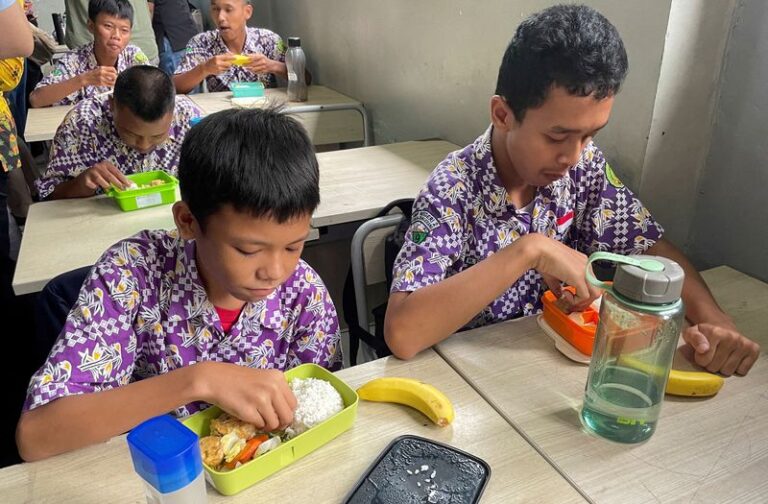By Stefanno Sulaiman and Rae Wee
JAKARTA/SINGAPORE (Reuters) – Indonesian President-elect Prabowo Subianto wants to offer free meals to schoolchildren, but the plan and his promise to be “bold” on spending are straining the country’s debt and currency markets.
Prabowo and his team have tried to distance themselves from any suggestion of fiscal profligacy and assure market participants that the new government will respect legal debt limits that cap its budget deficit at 3% of economic output.
But for a market still getting used to stability and recognition of fiscal prudence under current Finance Minister Sri Mulyani Indrawati, the mere suggestion of big spending is unsettling.
Bond yields rose and the rupee depreciated, although the currency’s weakness was largely due to the resilience of the US dollar.
“Our base case remains that this is more noise for now, but we see fiscal risk increasing and therefore the market may start demanding a higher risk premium on Indonesian government bonds,” said Jenny Zeng, chief investment officer for APAC fixed income at Allianz.
“Another risk is the change of ministers,” Zeng said, referring to uncertainty over who will succeed Sri Mulyani, the highly acclaimed former World Bank managing director.
A banker at a Chinese bank in Indonesia said fiscal concerns had prompted him to shift about 30% of his portfolio to lower-maturity instruments, including diversifying into short-term rupiah-denominated securities (SRBI) issued by Bank Indonesia.
Prabowo won the election in February but will not take office until October. His free meals plan, which his team estimates will cost 71 trillion rupiah ($4.35 billion) by 2025, is unlikely to cause much consternation.
Southeast Asia’s largest country has seen its finances improve under the Jokowi administration, running a sizeable budget surplus. Its bonds, which were classified as junk bonds at the turn of the century, are now considered investment-grade.
Some investors even see value in Indonesia spending more to meet its 8 percent economic growth target. Still, some question how much Prabowo plans to spend on his programs and whether he will be able to cut subsidies and investments in fuel and other things to balance the books.
“It seems like there are more uncertainties than certainties. I remain invested, but probably not as much as I was before,” said Clifford Lau, portfolio manager at William Blair.
Foreign portfolio investment declined with foreign investors withdrawing $2.8 billion from the government’s rupee bonds and its stock market till June this year.
The rupee is at a four-year low against the dollar, with losses of more than 5% this year, although most of those losses are linked to the broader decline in emerging market currencies due to rising US yields and a stronger dollar.
Investors looking for higher-yielding bonds have also turned to India, whose bonds not only have comparable yields but have also just joined JP Morgan’s global index.
The sales have pushed up Indonesia’s 10-year bond yield by 35 basis points since late May to 7.05%.
IT’S NOT ALL BAD
Some investors are giving Prabowo the benefit of the doubt, noting that his administration also plans to raise revenues and improve tax compliance, and cap the budget deficit at 2.8 percent of GDP, although higher than this year’s target of 2.3 percent.
“He also talks about the need to increase tax revenues… so it’s not just about increasing spending,” said Jerome Tay, head of Asia investment at Abrdn. Mr Tay is overweight and positive on medium-term Indonesian government bonds.
These bonds have long been popular with emerging market investors because of their “carry” or high yield.
The spread between Indonesian and U.S. bond yields is currently half the 600 basis points it was before the Federal Reserve began raising rates in 2022, but they remain attractive for fixed-income investors.
The country is also less vulnerable today, with foreign holdings accounting for just 14% of outstanding government bonds, compared with half that a decade ago.
Expectations that the Fed will soon start cutting rates are a comfort to investors in rupiah and Indonesian bonds, said Rudiyanto, director at local asset management firm Panin.
But other risks loom, including the maturity of a colossal debt of around 800 trillion rupees in 2025, almost double this year, although Sri Mulyani said refinancing would not be a problem, provided the government maintains market confidence.
($1 = 16,335.0000 rupees)
(Reporting by Stefanno Sulaiman, Rae Wee and Ankur Banerjee; Editing by Vidya Ranganathan and Kim Coghill)


